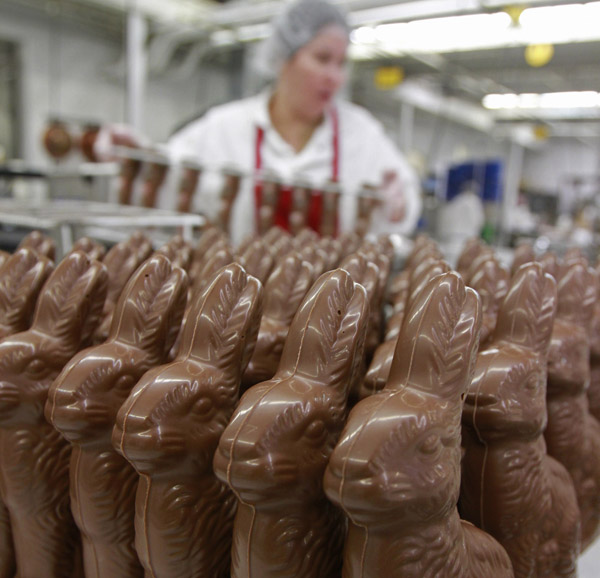Cupid got off easy this Valentine’s Day, but spikes in cocoa bean and sugar prices may have the Easter bunny digging deeper into your pocket for those chocolate eggs and rabbits.
Chocolate prices are going up, but Valentine’s chocolates are mostly already on shelves with prices set. It’s possible high-quality Valentine’s products could cost a little more, but by Easter prices likely will rise, possibly by as much as 5 percent, said Marcia Mogelonsky, U.S.-based global food analyst for Mintel.
“That’s when we’re going to see it,” she said.
There are a few reasons behind the increase, including political turbulence in Ivory Coast, the world’s largest producer of cocoa beans, that led to a one-month ban on exports that was announced in late January.
In a statement posted on its website, Mars Inc., makers of Snickers, Dove and other chocolate products, said officials are concerned about the situation and working with suppliers. However, the company said officials “are certain that in the short term this will not impact our ability to manufacture the chocolate products that our consumers desire, with the quality they expect.”
At the National Confectioners Association, spokeswoman Susan Smith said officials can’t predict the future, but the goal is to bring an immediate end to the crisis. “We are confident, however, that chocolate will remain an affordable treat and continue to play a role in American customs and celebrations,” she said.
But with Ivory Coast producing about a third of the world’s cocoa, Mogelonsky said it could be hard to hold prices. Cocoa prices rose 12 percent in January alone.
Phil Lempert, the food marketing expert known as The Supermarket Guru, agrees that with raw materials becoming more expensive, prices are bound to be affected. However, he notes that chocolate imported from China, which mostly falls in the novelty category, may stay the same.
“Domestically produced chocolate will go up; European chocolate will go up. The question is will those imported Easter bunnies from China go up. And that we don’t know,” he said.
At the Lake Champlain Chocolate Co., an upscale producer based in Burlington, Vt., Ellen Reed, in charge of purchasing, has been following the cocoa market closely. She doesn’t expect the ban to have a short-term effect, particularly because most companies have long-term contracts.
Lake Champlain isn’t selling reduced-size packages at previous prices, a move common in the food industry. But the company has adapted to consumers’ shrinking budgets by introducing new, smaller sized products at lower prices, said Reed, who is the daughter of company founder Jim Lampman.
“It’s gourmet chocolate we want everyone to enjoy,” said Reed. “Even if they don’t have $40 to spend on a box of chocolate, hopefully they can at least try our chocolate at a price point under $10.”
Reed says it’s hard to say what will happen on prices. Currently, Lake Champlain is locked into a contract, but there are other factors that affect costs.
As for what will happen in the future, “there will be a point where I think everybody will have to reevaluate their pricing and look at their packaging sizes,” Reed said. “I don’t think that we’ll see the cocoa market go down to where it was five or 10 years ago. I think it’s going to continue to increase and farmers are going to want to get paid more.”
Send questions/comments to the editors.



Success. Please wait for the page to reload. If the page does not reload within 5 seconds, please refresh the page.
Enter your email and password to access comments.
Hi, to comment on stories you must . This profile is in addition to your subscription and website login.
Already have a commenting profile? .
Invalid username/password.
Please check your email to confirm and complete your registration.
Only subscribers are eligible to post comments. Please subscribe or login first for digital access. Here’s why.
Use the form below to reset your password. When you've submitted your account email, we will send an email with a reset code.